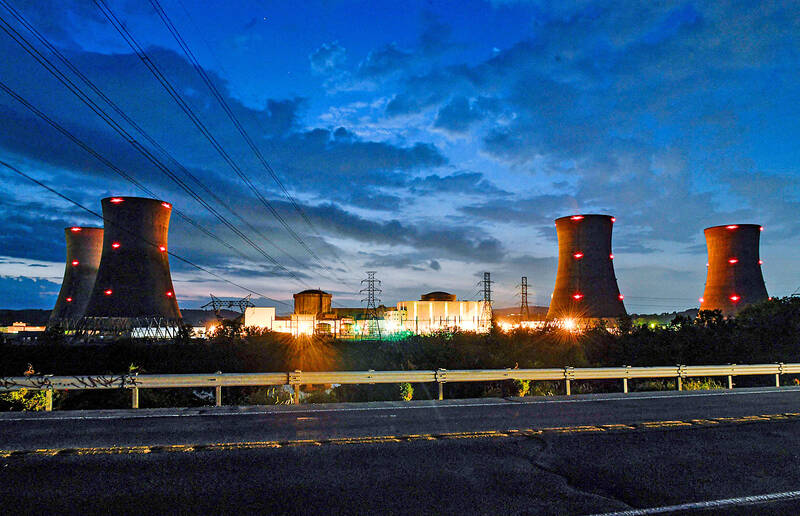Three Mile Island, the site of the US’ worst nuclear accident, would restart operations to provide power to Microsoft Corp, US electricity company Constellation Energy Corp announced on Friday.
Microsoft would use the capability to deliver its expanding artificial intelligence (AI) and cloud services, which are putting pressure on local electricity providers as tech giants build more power-hungry data centers.
The 20-year agreement involves restarting Unit 1, which “operated at industry-leading levels of safety and reliability for decades before being shut down for economic reasons exactly five years ago,” Constellation said in a statement.

Photo: AFP
Unit 1 was not involved in the 1979 partial nuclear meltdown at the Pennsylvania site.
Before its premature retirement in 2019, the plant could power more than 800,000 average homes.
Microsoft would use this energy to support power grids in the mid-Atlantic states around Washington DC, a region considered an internet crossroads.
Microsoft vice president of energy Bobby Hollis said that Three Mile Island’s nuclear energy would bolster a power grid covering 13 states.
This area faces severe strain from data centers’ massive energy consumption, raising concerns about grid stability as AI demands increase.
Tech giants such as Microsoft, Amazon, and Google are rapidly expanding their data center capabilities to meet the AI revolution’s computing needs while also scouring the globe for sources of electricity.
Hollis said the project was part of a “multi-technology approach” to sourcing power — which also includes wind and solar energy — and “an essential pathway to achieving our goal of becoming carbon negative by 2030.”
Microsoft earlier this year signed a deal with Canada’s Brookfield Asset Management Ltd to develop more than 10.5 gigawatts of new wind and solar farms, marking one of the largest corporate purchases of renewable energy to date.
Constellation Energy expects the Three Mile Island reactor to go back online in 2028.
Seen as a more consistent source of power than solar and wind, many tech companies are betting on nuclear energy’s rapid development to meet AI’s electricity demands.
Amazon Web Services agreed in March to invest US$650 million in a data center campus powered by another 40-year-old Pennsylvania nuclear plant.
Tech companies are also interested in small modular reactors, which are more compact and potentially easier to deploy — with big investments by Microsoft founder Bill Gates in the sector.
However, this technology is still in its infancy and lacks regulatory approval, leading companies to seek out existing nuclear power options.
Nuclear energy has staunch opponents due to concerns about radioactive waste disposal, the potential for catastrophic accidents, and the high costs associated with plant construction and decommissioning.
The 1979 partial meltdown of Unit 2 at Three Mile Island caused panic in the US and brought the expansion of nuclear energy to a standstill.
The US Nuclear Regulatory Commission deemed it the “most serious accident in US commercial nuclear power plant operating history,” although it also said there were no detectable health effects on workers or the public from the small radioactive releases.

The US dollar was trading at NT$29.7 at 10am today on the Taipei Foreign Exchange, as the New Taiwan dollar gained NT$1.364 from the previous close last week. The NT dollar continued to rise today, after surging 3.07 percent on Friday. After opening at NT$30.91, the NT dollar gained more than NT$1 in just 15 minutes, briefly passing the NT$30 mark. Before the US Department of the Treasury's semi-annual currency report came out, expectations that the NT dollar would keep rising were already building. The NT dollar on Friday closed at NT$31.064, up by NT$0.953 — a 3.07 percent single-day gain. Today,

‘SHORT TERM’: The local currency would likely remain strong in the near term, driven by anticipated US trade pressure, capital inflows and expectations of a US Fed rate cut The US dollar is expected to fall below NT$30 in the near term, as traders anticipate increased pressure from Washington for Taiwan to allow the New Taiwan dollar to appreciate, Cathay United Bank (國泰世華銀行) chief economist Lin Chi-chao (林啟超) said. Following a sharp drop in the greenback against the NT dollar on Friday, Lin told the Central News Agency that the local currency is likely to remain strong in the short term, driven in part by market psychology surrounding anticipated US policy pressure. On Friday, the US dollar fell NT$0.953, or 3.07 percent, closing at NT$31.064 — its lowest level since Jan.

The New Taiwan dollar and Taiwanese stocks surged on signs that trade tensions between the world’s top two economies might start easing and as US tech earnings boosted the outlook of the nation’s semiconductor exports. The NT dollar strengthened as much as 3.8 percent versus the US dollar to 30.815, the biggest intraday gain since January 2011, closing at NT$31.064. The benchmark TAIEX jumped 2.73 percent to outperform the region’s equity gauges. Outlook for global trade improved after China said it is assessing possible trade talks with the US, providing a boost for the nation’s currency and shares. As the NT dollar

The Financial Supervisory Commission (FSC) yesterday met with some of the nation’s largest insurance companies as a skyrocketing New Taiwan dollar piles pressure on their hundreds of billions of dollars in US bond investments. The commission has asked some life insurance firms, among the biggest Asian holders of US debt, to discuss how the rapidly strengthening NT dollar has impacted their operations, people familiar with the matter said. The meeting took place as the NT dollar jumped as much as 5 percent yesterday, its biggest intraday gain in more than three decades. The local currency surged as exporters rushed to